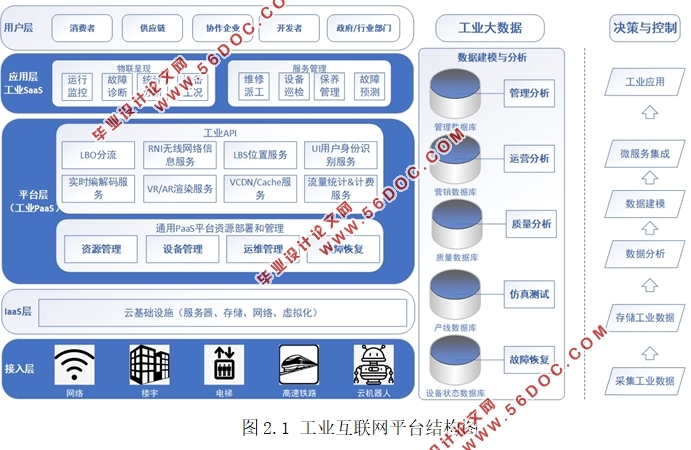5G移动通信技术在工业互联网中的应用研究
来源:wenku7.com 资料编号:WK716693 资料等级:★★★★★ %E8%B5%84%E6%96%99%E7%BC%96%E5%8F%B7%EF%BC%9AWK716693
以下是资料介绍,如需要完整的请充值下载。
1.无需注册登录,支付后按照提示操作即可获取该资料.
2.资料以网页介绍的为准,下载后不会有水印.资料仅供学习参考之用. 密 保 惠 帮助
资料介绍
5G移动通信技术在工业互联网中的应用研究(任务书,开题报告,论文22000字)
摘 要
5G是第五代移动通信技术的简称,是由云计算网络服务架构支撑的服务体系;工业互联网是互联网目录的分类,是工业系统与计算、传感、分析及互联网技术的高度融合。由于5G和工业互联网在技术层面都具有规范性和开放性,并且5G移动通信技术的低延时性、高速率和边缘计算能够给用户带来更优质的服务体验,因此5G和工业互联网的产业融合可以助力工业互联网的发展。本文通过对5G移动通信技术和工业互联网的研究,总结工业互联网的发展和研究现状以及5G移动通信技术的技术特点与优势,讨论5G移动通信技术如何解决工业互联网的行业痛点促进智能服务转型,总结5G技术在工业互联网中的多个应用场景,并对5G技术在工业互联网应用中的挑战进行了详细探讨。
关键词:5G;工业互联网;边缘计算;应用;挑战
Abstract
5G is the abbreviation of the fifth generation mobile communication technology. It is a service system supported by the cloud computing network service architecture. The industrial Internet is the classification of the Internet directory, which is a high integration of industrial systems with computing, sensing, analysis and Internet technologies. Since 5G and Industrial Internet are normative and open at the technical level, and the low latency, high rate and edge computing of 5G mobile communication technology can bring better service experience to users, 5G and industrial Internet industry Integration can help the development of the industrial Internet. Through the research on 5G mobile communication technology and industrial Internet, this paper summarizes the development and research status of industrial internet and the technical characteristics and advantages of 5G mobile communication technology, discusses how 5G mobile communication technology can solve the industrial pain points of industrial Internet and promote the transformation of intelligent service. 5G technology in the industrial Internet multiple application scenarios, and the challenges of 5G technology in industrial Internet applications are discussed in detail.
Key Words:5G; industrial internet; edge computing; application; challenge

目 录
摘 要 I
Abstract II
第一章 绪论 1
1.1 选题背景 1
1.2 研究方法与研究思路 1
1.3 国内外研究动态 2
第二章 工业互联网相关理论介绍 4
2.1 工业互联网研究现状 4
2.1.1 工业互联网概念及特点 4
2.1.2 工业互联网产业相关政策 4
2.1.3 工业互联网相关技术 6
2.2 工业互联网平台发展现状 7
2.2.1 工业互联网平台基本架构 7
2.2.2 工业互联网平台分类 8
第三章 5G相关理论介绍 13
3.1 5G研究现状 13
3.1.1 5G基本概念及特点 13
3.1.2 5G关键技术 15
3.2 5G产业链分析 16
3.2.1 5G上游产业链 16
3.2.2 5G中游产业链 17
3.2.3 5G下游产业链 17
第四章 5G移动通信技术在工业互联网中的应用 18
4.1 工业互联网行业痛点 18
4.1.1 网络灵活性差成本高限制行业发展 18
4.1.2 计算能力不足 18
4.1.3 生产模式单一 18
4.1.4 工业生产场景复杂维护困难 19
4.1.5 制造企业管理模式传统 19
4.2 5G与工业互联网结合推动智能服务转型 19
4.2.1 5G高灵活性和低成本性推动行业发展 19
4.2.2 5G边缘计算推动制造工厂内边缘智能化 20
4.2.3 助推柔性制造实现生产智能化 22
4.2.4 工厂维护模式全面升级 22
4.2.5 工业机器人优化管理模式 23
4.3典型应用场景 24
4.3.1 自动化控制 24
4.3.2 工业视觉 24
4.3.3 工业AR 25
4.3.4 物流追踪 26
4.3.5 云化机器人 27
4.3.6 资产跟踪 28
4.3.7 工业智能传感器 28
4.3.8 远程实时控制 29
第五章 5G在工业互联网应用的挑战 33
5.1 无线连接发展进程缓慢 33
5.2 工业互联网对5G网络灵活性提出更高要求 33
5.3 应用场景较为琐碎 34
5.4 商业模式有待清晰 34
5.5 跨界融合难 34
5.6 制造业企业的数字化转型制度仍相对落后 35
第六章 结论与展望 36
参考文献 37
致 谢 39
|



